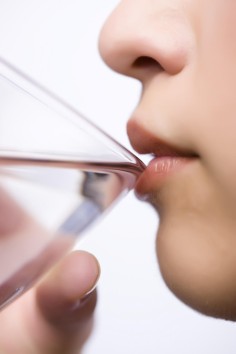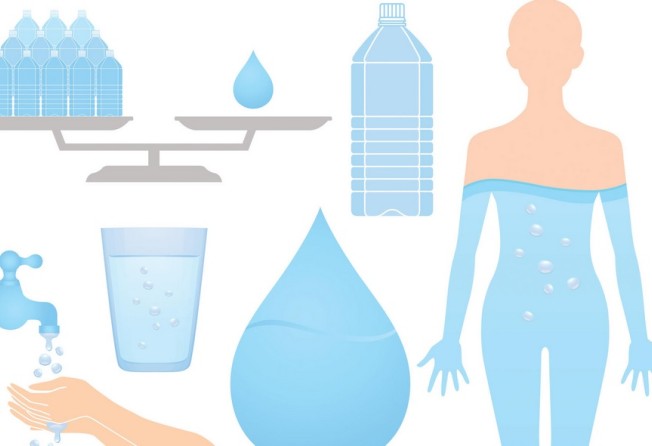
Should you drink only when thirsty, or before thirst strikes?
Experts are divided on whether you should you drink water only when thirsty or before it happens. David Wilson sifts through the evidence


Acupuncturist and general practitioner Liem Quang Le, who has worked with Olympic athletes, advocates the second, anticipatory approach. "Always make sure you drink before you are thirsty - you are already dehydrated when your body sends a signal to your brain that you should drink water," Le says and proposes you consume one litre for every 23kg of body weight daily.
During exercise, drink water roughly every 20 minutes, he says. Also drink between meals. Then, according to Le, you avoid diluting your stomach acids, so nutrients are readily absorbed.
Le says your body counts on being hydrated to lubricate your internal organs. Besides, hydration keeps your skin looking supple and healthy. It also regulates your body temperature, aids weight control, boosts energy and flushes out waste and toxins, helping maintain your immune system. So hydrate fully and your body will love you for it.
Even mild dehydration, which is defined as about 1.5 per cent loss of normal water volume in the body, can alter a person's mood, energy level and ability to think clearly, according to two studies conducted at the University of Connecticut's human performance laboratory.
The tests showed that it didn't matter if a person had just walked for 40 minutes on a treadmill or was sitting at rest - the adverse effects of mild dehydration were the same.
In one of the studies published in 2012 in The Journal of Nutrition, mild dehydration caused headaches, fatigue and difficulty concentrating among female test subjects of an average age of 23.
The adage that you should drink before you are thirsty is a myth
In the other study involving young men published in 2011 in the British Journal of Nutrition, mild dehydration caused some difficulty with mental tasks, particularly in the areas of vigilance and working memory.
The co-author of the health guide TurboCharged, Dian Griesel, agrees that we should hydrate frequently, regardless of thirst. "When we experience an unmistakable thirst signal, we are already very dehydrated," Griesel says, adding that a critical deficiency level of up to 5 per cent may have been reached when the urge arises.
Such a shortfall is bad news because, according to Griesel, hydration underpins the performance of every physiological function. For much of our evolutionary past before agriculture, almost everything we ate had a high water percentage, she says.
Now, in her view, we are more prone to be parched because we consume grain products, processed foods, coffee, fizzy drinks and alcohol.
Professional nurse Jonathan Steele, who trains "hydration coaches", also advises ample hydration irrespective of thirst. "Thirst is a poor indicator of hydration needs," he says, warning you can lose up to three litres of water a day automatically. Just breathing uses two litres, it seems. "Add urine and sweat and the losses mount up," he says.
Like Griesel, he supports taking your first drink early: within 20 minutes of waking. Otherwise, he warns, you will trigger a chemical reaction that tells your body you have entered starvation mode, which means you start storing fat.
Beware of mistaking thirst for hunger. Also, he says, understand that as you age, you lose the thirst sensation, which is further incentive to top up on the vital resource. Eight cups or two litres daily is recommended by health authorities.
Others insist that you should just trust your instincts, or your inbuilt thirst reflex honed by evolution. Christopher Neck, an ultramarathoner and management lecturer who runs in the blistering Arizona heat, takes that line.
"I know my hydration: the adage that you should drink before you are thirsty is a myth. You should drink according to thirst," Neck says. Forget quaffing water like clockwork every 30 minutes, he says. "Drink when you are thirsty," he says, citing a study conducted by the Sports Science Institute of South Africa.
For the study, runners did three two-hour workouts while consuming a sports drink at three different rates: by thirst (roughly 400 millitres per hour), at a moderate rate (about 120ml every 15 to 20 minutes), and at a high rate (about 300ml every 15 to 20 minutes). The study found no major difference in core body temperature or finishing times among the three trials.
Such findings fuel the "drink to thirst" movement, which urges athletes not to over-hydrate in case they dilute their sodium levels and trigger potentially lethal hyponatremia, or water intoxication.
The movement has some persuasive supporters, including the high-profile doctor Chris van Tulleken and exercise scientist Dr Tim Noakes, who frames the claim that you should guzzle water as bunkum peddled by a vested interest.
"The idea that thirst comes too late is a marketing ploy of the sports-drink industry," Noakes said in a March 2014 story run by the health hub Active.com Still, most analysts maintain you should commit to abundant hydration ahead of thirst.
The way to gauge your hydration level, experts say, is simple: check your urine. While clear or light urine the same shade as lemonade means you are well-hydrated, a dark yellow or amber colour usually means the reverse.
